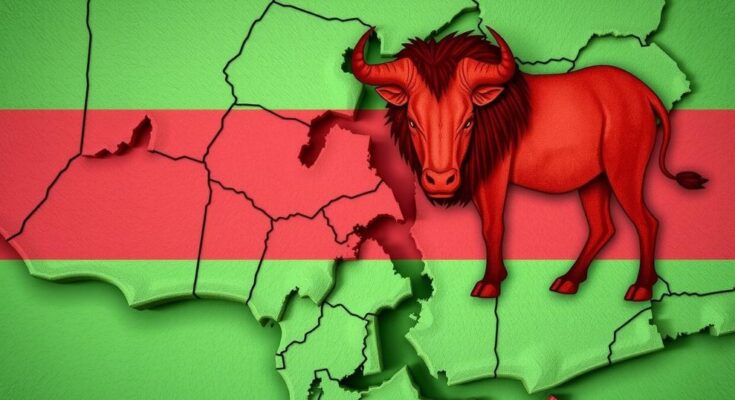This article critically evaluates Namibia’s status as a stable democracy against the backdrop of state failure definitions and benchmarks. While it boasts democratic governance, Namibia faces significant challenges in economic inequality, corruption, and public service delivery, which threaten its overall effectiveness. Recommendations for improvement include economic diversification, anti-corruption measures, and enhanced public services to bolster state resilience.
The concept of state failure has garnered considerable global attention as nations grapple with varying degrees of governance and stability. While Namibia is often viewed as a peaceful, stable democracy, a critical evaluation against the parameters of effective state functionality is warranted. This analysis delineates the criteria for state failure, investigates factors influencing it, reviews Namibia’s current standing, and provides recommendations for future enhancement of its governance structures.
State failure encompasses a government’s incapacity to fulfill core responsibilities, such as ensuring security, delivering essential services, maintaining legitimate governance, and upholding the rule of law. Robert Rotberg (2004) defines a failed state as one that experiences a diminished hold on the legitimate use of force, an inability to provide public goods, pervasive corruption, and weakened institutions. Such states typically confront social unrest, economic collapse, and diminished public trust.
The Fragile States Index (FSI), formed by the Fund for Peace, is a leading instrument for evaluating state fragility worldwide. It encompasses metrics such as economic disparity, political stability, social cohesion, and public service performance. Countries achieving low scores are often categorized as “fragile” or “failing.”
Since achieving independence in 1990, Namibia has made commendable progress in political stability and democratic governance. Nonetheless, the remnants of colonialism and apartheid have cultivated a landscape of economic inequality and land dispossession. It is noteworthy that Namibia has experienced peaceful elections and maintained commendable environmental policies when juxtaposed with its neighbors; however, it still grapples with high rates of unemployment and entrenched corruption.
Namibia’s exceptional democratic governance is evident in its rankings; nevertheless, emerging hurdles prompt queries about its sustained effectiveness as a state. Income inequality in Namibia is alarmingly high, with a Gini coefficient of 0.591 as of 2021 (World Bank, 2023). This inequality exacerbates poverty, particularly in rural regions, and the staggering unemployment rate of 33% reported in 2022 disproportionately impacts the youth.
Additionally, corruption poses a significant threat to public confidence, exemplified by scandals such as the “Fishrot” case, which have underscored deficiencies in transparency and accountability. According to Transparency International’s Corruption Perceptions Index (CPI), Namibia’s score of 49/100 in 2023 highlights moderate corruption, meriting urgent intervention.
While Namibia boasts relatively strong institutions compared to regional counterparts, challenges persist in public service funding, judicial delays, and inefficient land reform processes. Social tensions surface periodically through protests related to economic conditions, unemployment, and gender-based violence, indicative of broader societal dissatisfaction.
Infrastructure deficits hinder access to essential services like water, electricity, and healthcare. Water scarcity remains a critical issue in rural areas, aggravated by drought and outdated infrastructures. Criticism of NamWater for insufficiently addressing water shortages underscores the challenges related to public service delivery.
The nation’s reliance on natural resources and vulnerability to climate change further complicate its challenges; recurrent droughts have intensified water shortages and adversely impacted agriculture, which is vital for many rural livelihoods. Without substantial investment in sustainable water infrastructure and climate adaptation strategies, existing inequalities could become exacerbated.
In the FSI 2023 rankings, Namibia is classified as ‘stable,’ reflecting its resilience. Nonetheless, it is essential to recognize areas requiring improvement, particularly regarding economic inequality, demographic pressures, and public service delivery (Fund for Peace, 2024). To bolster its resilience, Namibia should consider diversifying its economy beyond mining by investing in agriculture, renewable energy, and technology, alongside support for small and medium enterprises and youth entrepreneurship.
Strengthening legal frameworks for prosecuting corruption and enhancing transparency in public procurement are crucial measures. Additionally, vocational training and digital skills development should be prioritized to prepare the youth for evolving industries. Investing in sustainable water infrastructure, renewable energy, and climate-resilient agriculture will also be instrumental in addressing environmental vulnerabilities. Empowering regional governments and fostering partnerships among government, private sector, and civil society are vital for collaborative solutions to pressing issues.
Conclusively, while Namibia is not classified as a failed state, substantive vulnerabilities remain that could undermine its stability if unaddressed. Addressing economic inequities, enhancing transparency and accountability, improving public service delivery, and preparing for climate impacts are essential steps towards maintaining its reputation as a stable and peaceful democracy. Targeted reforms and inclusive governance will dictate the trajectory of Namibia’s future resilience and stability.
The article examines the topic of state failure, a phenomenon of increasing concern as nations strive for effective governance and stability. It defines state failure and highlights the criteria used to assess a country’s resilience, specifically focusing on Namibia. The analysis draws attention to Namibia’s historical context, its challenges regarding inequality, corruption, and governance structures, and compares its situation with that of neighboring countries. Ultimately, the article aims to provide insights for improving Namibia’s underlying vulnerabilities to continue its progress as a stable democracy.
In presenting Namibia’s governance challenges, the article delineates a clear path toward improvement and resilience. While the country is not classified as a failed state and upholds political stability, the pressing issues of economic inequality and corruption call for immediate action. By embracing proactive measures such as economic diversification, enhanced transparency, and sustainable environmental practices, Namibia can not only safeguard its current democratic standing but also ensure a sustainable future for its citizenry.
Original Source: www.namibian.com.na




